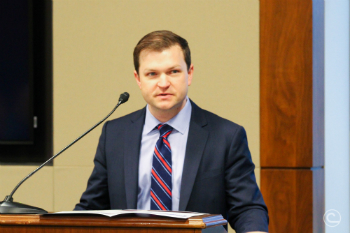NACD in the News:
March Media Highlights
NACD's officers and staff advocate for conservation every day - check out last month's media coverage to learn how NACD is working for you. Be sure to follow and like us on Facebook for more interviews, articles and GOOD READS about conservation.
NACD President Pleased Omnibus Bill Helped Restore Conservation Funding: Radio 570 WNAX
By Tom Riter
NACD members were pleased with the recent omnibus funding bill passed by Congress and signed by the President. NACD President Brent Van Dyke says when their members met with lawmakers last week in Washington, D.C., they were concerned about funding shortfalls for conservation programs. Van Dyke was encouraged by the conservation funding included in the bill.
President-Elect Tim Palmer speaks on the results of a three-year cover crop and no-till study: Successful Farming
By Jodi Henke
Conservation practices such as cover crops and no-till can limit soil loss, reduce run-off, and provide economic advantages.
Tim Palmer is president-elect of NACD and says they have favorable results from a three-year study where corn and soybean farmers experimented with cover crops, and/or no-till. "Even though it costs extra to put cover crops on, there was a return on investment from having them out there to the producer, up to $110 per acre extra profit for adopting," Palmer said.
Adams on Agriculture with NACD Director of Government Affairs Coleman Garrison: American Ag Network
By Mike Adams
Adams: When I look back thinking about covering conservation efforts in the last 20-30 years, you have a great story to tell. We’ve seen the benefits of these programs and how that partnership with government funding and the private partnership working together—so much has been accomplished.
Garrison: Absolutely. Conservation districts were created back in the 30’s to be that local partner to help deliver conservation. It’s that voluntary, incentive-based conservation delivery model that's been so successful over all these decades, and we believe this is certainly not a time when less investment needs to be done. Granted, we understand the budget constraints that Congress is facing, that's why we are hoping that, at a bare minimum, no more funding be taken out of the Conservation Title of the farm bill.

GOOD READS
Trump signs giant spending package after veto threat: Agri-Pulse
By Philip Brasher
The bill also eliminates the requirement that landowners who participate in conservation programs obtain System for Award Management (SAM) and Data Universal Numbering System (DUNS) numbers. “Removing the burdensome task of SAM/DUNS reporting allows landowners and operators to prioritize conservation program participation without hindrance," NACD CEO Jeremy Peters said.
Conservation Funding Expected to Lag Behind When Farmers Need it Most: Civil Eats
By Bryce Oats
“Good conservation programs provide pathways to treat local conservation concerns, and those can vary quite drastically across the country,” said NACD President-elect Tim Palmer, a crop and livestock farmer from Madison County, Iowa. “The improvements that solve local resource challenges, like erosion and damage from nutrients [i.e., nitrogen and phosphorous] in Southern Iowa, require funding and boots on the ground from conservation professionals to provide farmers with the guidance they need.”